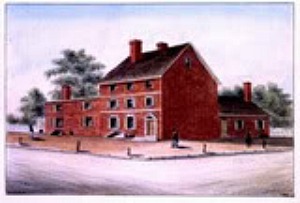Related Topics
..Tax and Fiscal Issues in the Constitution, Morris (1)
For some founding fathers, monetary issues were all that mattered.
Economics of the Oct. 4th, 1779 Attack on Fort Wilson

|
| Fort Wilson |
From time to time new essays appear, arguing the dynamics of the Fort Wilson episode of mortal gunfire between factions of the Revolutionary cause. The event is an important one, primarily because it involved several men who later were Delegates to the Constitutional Convention. It thus casts light on the economic attitudes of leaders in the effort to revise the constitutional rules for property which emerged eight years later, in 1787. It seems entirely fair to suppose that men whose lives were threatened by armed conflict with their comrades had retained a vivid memory of it.
In the first place, what became an armed conflict over inflation and food shortages was a dispute which lasted more than six months, and had the outlines of an organized conflict between two parties, the Republicans and the Constitutionalists, which also had the character of class warfare between the merchant class and the yeomanry of the city. And although the economic issues involved in this conflict have been recurrent over a period of two hundred years, they are not exactly settled in the minds of the two parties. It is not too much to suppose that a representative group of present-day Democrats and Republicans would divide into majorities who favor or oppose price controls, and who are made up of two social groups who style themselves Upper Class and Middle Class.
The most recent analysis of Fort Wilson was written by John K. Alexander in October 1974 in the William and Mary Quarterly and it is quite a detailed examination of the subject. Although the Pennsylvania militia did much of the fighting and introduced the extraneous issue of patriotic military service, they were escalating the anger of what probably started as reasoned economic debate. Food scarcities appeared on every side and were severe, prices were skyrocketing. It seemed entirely reasonable to this faction that merchants were raising their prices deliberately, taking advantage of food shortages, and that it was the responsibility of government to side with consumers to hold prices down with price controls. The merchant class calling themselves Republicans were led by Benjamin Rush, who grew concerned that the more numerous common people would use their majority power to injure the interests of the merchants. In the eyes of the consumer class, it is merchants who mainly set prices, and thus merchants must be restrained by government. Their viewpoint was augmented by the writings of John Locke, who had urged that the common people have a right to take arms when government fails them.
Almost any modern economist would reflexly assume that the problem underlying this agitation was inflation, generally styled "paper money" by the politicians of that time. If too much money is in circulation, prices will go up. If price controls are imposed in that situation, goods will disappear from merchants' shelves, black markets will appear, and with people starving, riots will break out. Academic economists should not jump to the conclusion that this is obvious, however. Prices are normally set by the sellers, held in check by consumers refusing to buy at unfairly high prices. When inflation takes place, it does so in hidden places away from public view. The treasury issues paper money, or reduces the gold content of coins, or the Federal Reserve issues bonds, more or less unseen by the public. Prices rise but for a while, the public assumes they are rising in the traditional way, by merchants raising their prices. The public is often slow to believe that a new dynamic is affecting prices because they want to believe they still have the power to reduce prices by verbal abuse of the merchants; it doesn't work. By the time the public realizes things are serious, things are mostly getting out of hand. Starvation is now a real thing, and the discovery of hoarding by merchants who will not sell at the old prices only heightens their conviction that sharp dealing is responsible for their pain. When they finally become convinced that their government is the enemy in this matter, it becomes time to distrust government officers, and maybe to burn a few buildings. The better-educated class is generally the more affluent class, with more reserves to protect them longer from the pain which the lower classes are experiencing.
On the other hand, if you are Robert Morris trapped in Wilson's red brick house, with bullets whistling past your ears, you also forget about economic theory and consider how you can save your own life, liberty, and pursuit of happiness. As the immediate danger subsides, you ask how situations like this can be avoided. And while it cannot be claimed that America has cured itself of inflation, much stronger controls are now in place, and many more of the public understand where the fault lies. If paper money inflation ever gets seriously out of hand as it did in Germany, Austria, China, and Zimbabwe -- the public will tolerate almost anything else to avoid it, for as long as a century afterward. But not indefinitely, as long cycles of history unfortunately demonstrate.
REFERENCES
| The William and Mary Quarterly Oct,1974 Vol. XXXI No. 4 Page 589 John K. Alexander | Amazon |
Originally published: Monday, October 15, 2012; most-recently modified: Thursday, May 16, 2019